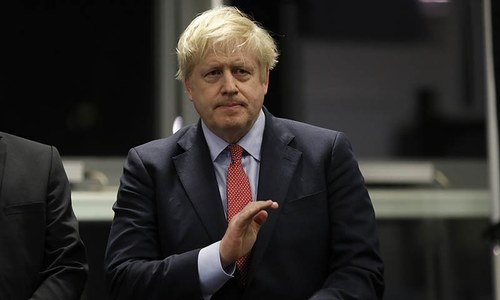LONDON: Britain’s parliament finally approved Brexit on Thursday, allowing it to become the first country to leave the European Union by the end of this month, ending years of arguments that toppled two governments and divided a nation.
The House of Commons erupted in cheers after MPs ratified Prime Minister Boris Johnson’s divorce deal with Brussels 330 votes to 231, drawing a line under an extraordinary era of political drama and chaos.
For much of the time since the 2016 Brexit referendum, lawmakers have been at each others’ throats over how, when or even if Britain should leave its closest trading partners after nearly 50 years.
Some viewed Brexit with horror, fearing that it stripped them of their European identities and turned Britain into an insular, less important nation. Others embraced it with fervour, viewing it as a chance to “take back control” from officials in Brussels and see Britain regain some of its past might.
But Johnson’s comprehensive victory in last month’s general election brought an abrupt end to the turmoil, giving his Conservatives a parliamentary majority with which to push it through.
MPs gave their initial blessing to the EU Withdrawal Agreement Bill before Christmas, and the government set aside just three days this week for detailed scrutiny of the complex text.
But few MPs even bothered to turn up on Tuesday and Wednesday, with both sessions ending early, while the government easily saw off opposition attempts to amend the text.
The momentous day on which Johnson effectively gets permission to abandon the European integration project was all but ignored in Thursday’s media.
Instead, it became a footnote to Prince Harry and his wife Meghan’s decision to quit royal front-line duties — christened “Megxit” and shaping up to be equally complicated and divisive.
“We will be leaving the EU on Jan 31. We will have delivered on the PM’s commitment to get Brexit done,” a government spokesman said, echoing Johnson’s election mantra.
Britain’s main opposition Labour party, bruised by its worst beating at the polls since 1935, voted against Brexit on Thursday knowing the battle had been lost.
We “may not win many votes in parliament just now, but we can win the moral argument”, said Labour’s Brexit spokesman Keir Starmer, a potential successor to Jeremy Corbyn as party leader. “Whatever [Johnson] says about the wider issues, he must know the government has got this wrong.”
The Brexit bill must still be passed by the unelected House of Lords and the European Parliament, seen as a formality.
All eyes are now on another major challenge: the negotiation of a new relationship between Britain and the remaining 27 EU nations, which form the world’s largest single market.
Published in Dawn, January 10th, 2020













































